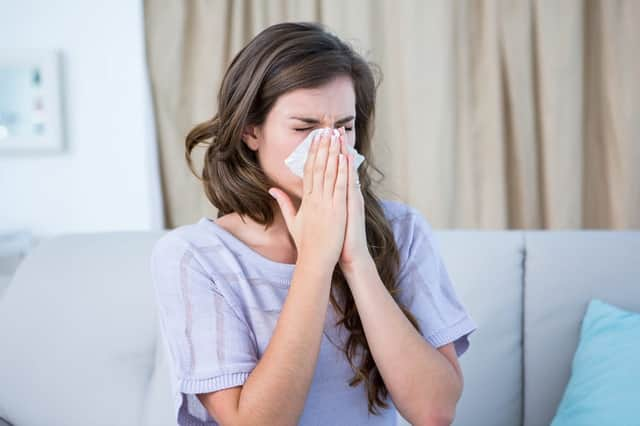Tips and tricks to relieve your hay fever symptoms as pollen levels rocket


Hay fever sufferers around the UK could be in for a difficult summer as experts warn about incoming high levels of pollen.
The high pollen levels could make allergy symptoms unbearable for millions of sufferers as grass pollen is the most common hay fever allergy, affecting 90 per cent of sufferers.
High levels of pollen
Advertisement
Hide AdAdvertisement
Hide AdThe Met Office has issued a warning in its pollen forecast, with much of the UK predicted to suffer from “very high” levels.
The upper end of Scotland, including Ornkey and Shetland, Highlands and Grampian, have managed to get away with low levels of pollen, however the further down you move in the UK, the higher the levels get.
The Lothians, Strathclyde and Fife areas are slated for medium pollen levels, as is Northern Ireland, but the majority of England is set for “very high” levels of pollen.
The Met Office explains that the “pollen count monitoring network combines Met Office weather data with expertise from organisations such as the National Pollen and Aerobiological Unit to produce pollen forecasts for 5 days ahead across the whole of the UK”.
How do I know if I have hay fever?
Advertisement
Hide AdAdvertisement
Hide AdThe NHS website lists the symptoms of hay fever as the following:
- Sneezing and coughing
- A runny or blocked nose
- Itchy, red or watery eyes
- Itchy throat, mouth, nose and ears
- Loss of smell
- Pain around your temples and forehead
- Headache
- Earache
- Feeling tired
It also clarifies that these symptoms will last weeks or months, making it easier to differentiate between allergies and a common cold which only lasts a week or so.
Asthma sufferers may also experience a tight feeling in their chest, shortness of breath, wheezing and coughing.
Symptoms of hay fever can last for weeks or months, according to the NHS, unlike a cold which usually goes away after around one or two weeks.
How do symptoms differ to coronavirus?
Advertisement
Hide AdAdvertisement
Hide AdSome people have mistakenly confused symptoms of hay fever for coronavirus, as there are a number of similarities.
However, while signs of hay fever include sneezing and a cough, much like coronavirus, the main difference is that it does not usually cause a high fever.
Hay fever sufferers also generally do not feel too unwell with it, unlike with coronavirus.
People who do suffer with hay fever are advised to compare their symptoms to what they have experienced in previous years if they are concerned.
How can I relieve hay fever symptoms?
Advertisement
Hide AdAdvertisement
Hide AdThere is currently no cure for hay fever, but there are a number of remedies you can try to relieve symptoms when the pollen count is high.
The NHS website issues the following advice for avoiding the brunt of hay fever symptoms when the pollen count is high:
- Put Vaseline around your nostrils to trap pollen
- Wear wraparound sunglasses to stop pollen getting into your eyes
- Shower and change your clothes after you have been outside to wash pollen off
- Stay indoors whenever possible
- Keep windows and doors shut as much as possible
- Vacuum regularly and dust with a damp cloth
- Buy a pollen filter for the air vents in your car and a vacuum cleaner with a special HEPA filter
You can also try taking antihistamine drops, tablets or nasal sprays to help with itchy and watery eyes, sneezing and a blocked nose.